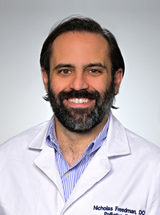CML Management: What Goals Can Clinicians Achieve With Current Treatments?
By Nikolai Podoltsev, MD, PhD, Andrew Moreno - Last Updated: April 15, 2025Nikolai Podoltsev, MD, PhD, is an associate professor in the section for Medical Oncology and Hematology in the Department of Internal Medicine at Yale School of Medicine, New Haven, Connecticut. He spoke with Blood Cancers Today about the current state of chronic myeloid leukemia (CML) management and recently presented on this subject at the Tri-State Blood Cancer Conference in New York City.
Dr. Podoltsev described the goals clinicians currently seek when they manage CML, a major one of which is to prolong patient survival. Thanks to the emergence of tyrosine kinase inhibitors (TKIs), it is now possible for patients to have near-normal life expectancies, though it is usually necessary for the patients to continue taking these agents over their lifetimes.
However, alongside survival extension, the achievement of treatment-free remission is increasingly becoming a management goal.
“Treatment-free remission as a goal is especially important for younger patients who otherwise will have to live with the disease and take the medication throughout their lives,” Dr. Podoltsev mentioned.
The prevention of accelerated- and blast-phase disease is another goal of CML management, but Dr. Podoltsev noted that more research is needed in this area. Also, although some patients who take TKIs can achieve “functional cure” with these agents, a significant percentage of patients who stop taking treatment will have to restart them.
“Because of unavailability of this discontinuation strategy, successful discontinuation strategy for the majority of patients, we still have work to do and research is needed to improve the number of patients who can accomplish this treatment-free remission goal,” Dr. Podoltsev explained.
TKIs have also led to reduced use of allogeneic stem cell transplantation in CML management, but transplant is still needed for patients who have accelerated- or blast- phase disease.
“Research has to continue to prevent these phases of the disease which are very challenging to treat and their cure is only possible a lot of times with just allogeneic stem cell transplant, which is the most challenging treatment we’re offering our patients,” Dr. Podoltsev commented.
In closing, the driving force that Dr. Podoltsev credited for recent advances in CML management is researchers’ growing knowledge of the basic biology of the disease.
“The understanding of the biology helped us to facilitate molecular diagnosis of CML, develop targeted therapies, continue with molecular monitoring after we started the targeted therapies, and when resistance occurs, if it does, we do know how to understand the resistance in some of the patients and overcome this with adjusting our treatments,” Dr. Podoltsev elaborated.






 © 2025 Mashup Media, LLC, a Formedics Property. All Rights Reserved.
© 2025 Mashup Media, LLC, a Formedics Property. All Rights Reserved.